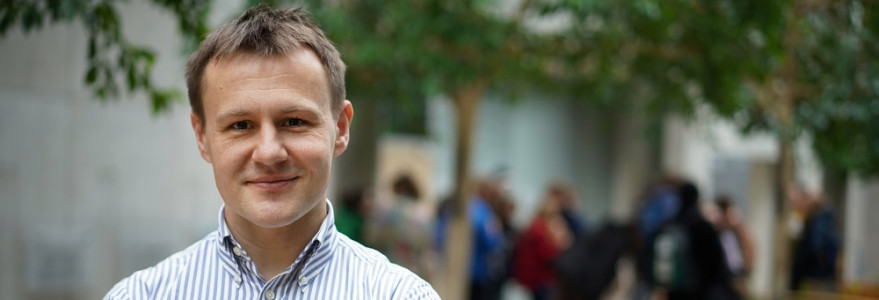How to design algorithms that ensure an equal treatment of implicit groups of voters? This issue has been raised by an ERC Starting Grant recipient, Prof. Piotr Skowron from the UW’s Faculty of Mathematics, Informatics and Mechanics and his team in the project “Proportional Algorithms for Democratic Decision”.
Prof. Piotr Skowron from the UW’s Faculty of Mathematics, Informatics and Mechanics is designing together with a team of researchers algorithms, which can be used for complex-structured elections. This feature applies e.g. to participatory budgeting elections.
The researchers presented a proportional election method used for counting votes, which they called the Method of Equal Shares. Through this method, the preferences of each group of voters can be taken into account in the process of decision making. It was already put into practice in Wieliczka and soon it will be applied in Świecie. The Method of Equal Shares designed by Prof. Skowron and his team was used also abroad in Aarau, Switzerland.
The algorithm for counting votes will be further analysed and developed in the project “Proportional Algorithms for Democratic Decision” (PRO-DEMOCRATIC), for which Prof. Skowron received a prestigious Starting Grant of the European Research Council. He will start the project in October.
https://www.youtube.com/watch?v=hl1_W3szw5A
Equal share of projects
Participatory budgeting elections in Poland are based usually on the standard voting method, which selects the projects with the highest votes. The method proposed by Prof. Skowron and other researchers is a new version of the proportional method.
“During the process of voting one can imagine a situation where 51 percent of the voters choose only all ‘blue’ projects and 49 percent only the ‘green‘ ones. Through the standard voting method, the resources in the participatory budget would be allocated to the ‘blue’ projects. Then, all the votes given to the ‘green‘ projects would be wasted. However, we only have to change the algorithm for counting votes to increase the number of voters satisfied with the outcomes of the elections,” Prof. Piotr Skowron explains.
The Method of Equal Shares is applied automatically, without involving the voters. Its innovation lies in changing the way funded projects are selected based on the same votes. First, the project with the highest number of votes is identified. The cost of the project is divided as equally as possible among the voters who voted for it. The same happens with another most popular project. This continues until all the money is distributed. Behind the method there is a reasoning that an equal share of the budget should be assigned to every voter. When voters have already spent their entire budget share (because the projects supported by them were selected), their other preferences are not counted. This way, the voice of other citizens can be heard, who have not yet supported any projects.
Prof. Piotr Skowron works at the Institute of Informatics of the UW’s Faculty of Mathematics, Informatics and Mechanics. His research interests combine topics from various fields, such as: mathematics, informatics and theoretical economics. In 2015, he received a runner-up award for the best doctoral dissertation on multi-agent systems (IFAAMAS Victor Lesser Distinguished Dissertation Award). After doctoral studies at the University of Warsaw, Piotr Skowron did two postdocs at the University of Oxford (2016–2017) and at the Technical University of Berlin (2017–2018). In 2020 he received the prestigious IJCAI Computers and Thought Award for his contributions to computational social choice, and to the theory of committee elections.
On the ERC project
The project “Proportional Algorithms for Democratic Decision” is set in the field of computational social choice. It was awarded with an ERC Starting Grant in the amount of €1,479,938. The main goal of the project is to analyse formal models describing scenarios, where a group of individuals disagrees on certain matters, yet needs to make a collective decision. This can be observed, for example, in the elections of representative bodies or in participatory budgeting. The researchers plan to prove whether and under which conditions the established notions of proportionality are satisfiable. Furthermore, they will design tools for analysing both electoral data and voting systems. Finally, the team will look for the most fair and efficient voting methods. More information on the research conducted under the grant can be found on the UW’s website >>
The grants of the European Research Council were awarded in 2023 to: Prof. Artur Obłuski from the Polish Centre of Mediterranean Archaeology, the University of Warsaw; Prof. Piotr Skowron from the UW’s Faculty of Mathematics, Informatics and Mechanics, Dr Agnieszka Brylak from the Faculty of Modern Languages and Prof. Katarzyna Marciniak from the Faculty of „Artes Liberales”.
The film on Dr. Agnieszka Brylak’s research can be found below:



